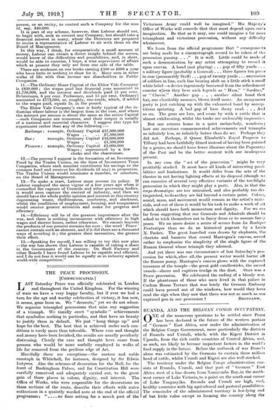Mercifully there are exceptions—the austere and noble cenotaph in Whitehall,
for instance, designed by Sir Edwin Lutyen.s. Also the schemes of decoration for the Mall, for the front of Buckingham Palace, and for Constitution Hill were carefully conceived and adequately carried out, to the great gain of those places in colour, dignity, and interest. The Office of Works, who were responsible for the decorations on these sections of the route, describe their efforts with naive enthusiasm in a quaintly worded note at the end of the official programme: ".... no finer setting for a march past of the Victorious Army could well be imagined." His Majesty's Office of Works will concede that that must depend upon one's imagination. Be that as it may, one could imagine a far more triumphant and victorious procession, without any difficulty whatsoever.
We learn from the official programme that "arrangements are being made for a cinematograph record to be taken of the procession passing. . . ." It is well. Little could be made of such a demonstration by any artist attempting to record it upon canvas. A band (not playing) . . . gap of fifty yards.
a solitary figure (probably a General) . three figures ten paces in rear (presumably Staff) ... gap of twenty yards .. . succession of soldiers in line, each line bearing aloft on a little stick a small white label—a device ingeniously borrowed from the refreshment counter where they bear such legends as "Ham," "Sardine," or "Cheese." Another gap . . . another silent band that has, one charitably assumes, blown itself mute. An anonymous party is just catching up with the exhausted band by surrep- titious sprinting. A bad gap of bare dusty road. . . . And so on. The guns are late, and come by with a rattle that is almost exhilarating, whilst the tanks are undeniably impressive.
But one returns home in a quiet melancholy, wondering how our ancestors commemorated achievements and triumphs so infinitely less, so infinitely better than do we. Perhaps they did not. Perhaps, if Queen Elizabeth's Royal Progress to Tilbury had been faithfully filmed instead of having been painted by a genius, we should have fewer illusions about the Pageantry of the Past and be the better oontent with our inadequate present.
In any case the "art of the procession" might be very profitably studied. It must have all kinds of interesting possi- bilities and limitations. It would differ from the arts of the theatre in not having lighting effects at its disposal (though we can conceive of several very effective variants of the torchlight procession in which they might play a part). Also, in that the corps dramatique are too untrained, and also probably too dis- tinguished, to do as they are bid beyond a certain point. Colour. sound, mass, and movement would remain as the artist's mate- rials, and out of these it would be his task to make a work of art which should have both momentum and dignity. For we aro far from suggesting that our Generals and Admirals should be asked to trick themselves out in fancy dress or to assume fancy poses. We no more desire a series of scenes from La Boutiqu! Fantastique than we do an historical pageant by a Louis N. Parker. The great laurelled cars drawn by elephants, the chariots and banners that crowd Mantegna's canvas, served rather to emphasize the simplicity of the single figure of the Roman General whose triumph they adorned.
And yet there was one circumstance of last Saturday's pro- cession for which, after all, the present writer would barter all the Roman pomp. Manteg,na's canvas glows with the captured treasures of the temple—the great gold candlesticks, the sacred vessels—slaves and captives trudge in the dust.. Ours was a Peace procession. We celebrated the ending of a bloody war. If the phantasms of those who once lived in that palace in Carlton House Terrace that was lately the German Embassy could have peered out of the windows, how would they have read the sign when they saw that there was not so much as one
captured gun in our procession ? BRONDANW.


































 Previous page
Previous page